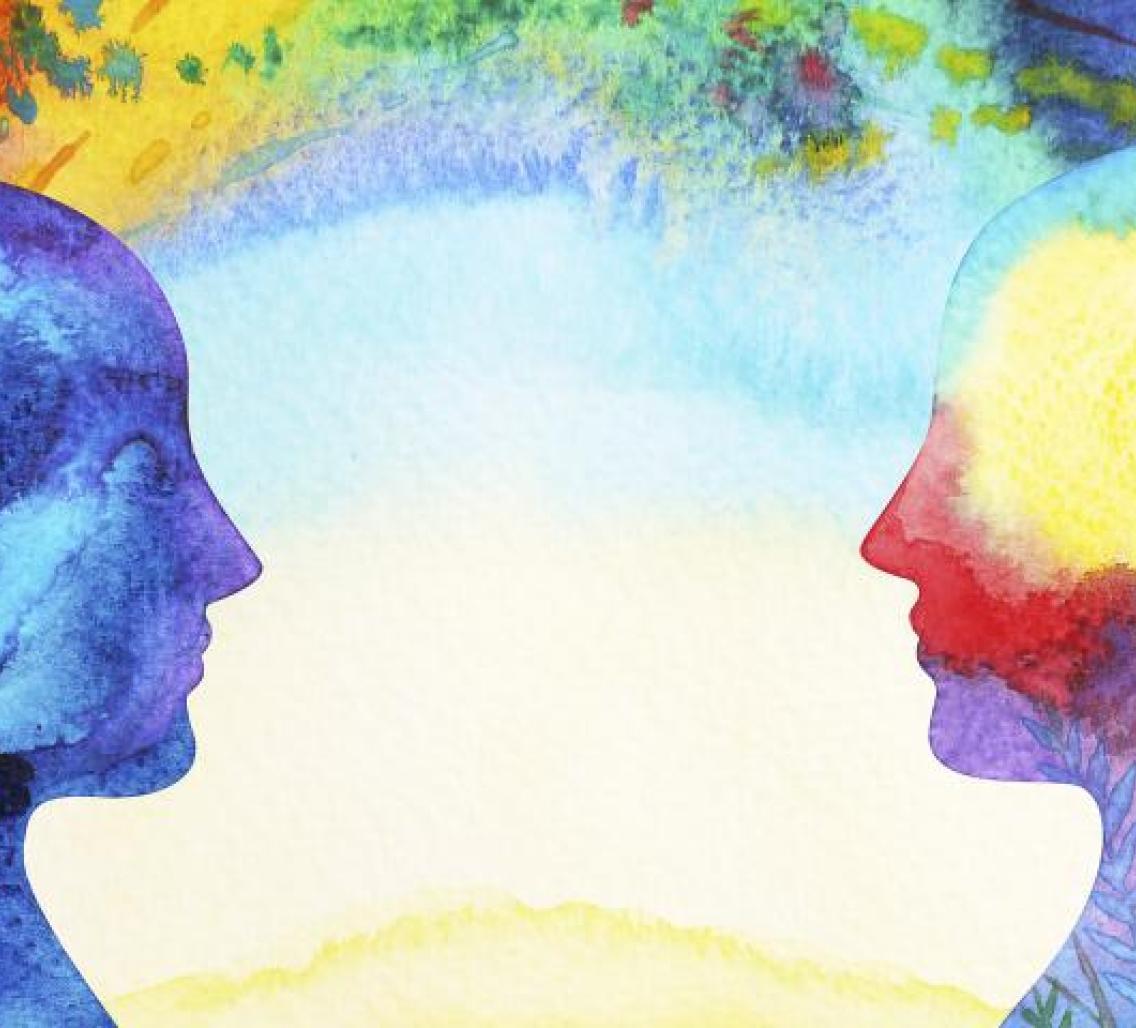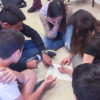Stanford researchers explore how the human mind shapes reality

By Nathan Collins
Search the internet for “the power of the mind,” and you’ll find some strange things: a program that promises to show you how to attract success simply by focusing on it, a great many nutritional supplements and a video purporting to show a Shaolin monk breaking things with his head. But beyond the hucksters and the hype, the mind actually can do some remarkable things, including shaping our health and well-being.
“Our minds aren’t passive observers, simply perceiving reality as it is. Our minds actually change reality,” said Alia Crum, an assistant professor of psychology and director of the Stanford Mind and Body Lab. Crum and other Stanford researchers – including many who recently took part in a World Economic Forum IdeasLab panel and Stanford Worldview’s Power of Minds meeting – are bridging medicine, psychology, education, business and more to understand not just what our minds can do, but also how they do it.
Shaping health
Probably the best known way the mind shapes reality is the placebo effect, where people get better if they simply believe they are being treated for a disease. For ages, that was viewed as just an experimental hassle – something to take into account when testing the effectiveness of a new drug, for example.
It’s essential to recognize that mindsets are not peripheral, but central to health and behavior.
— ALIA CRUM, Assistant Professor of Psychology
Yet doctors are starting to rethink placebos not as a hassle but as an actual path to better health. After all, placebo effects and the underlying mindsets and social contexts that create them have real effects on health, from reducing anxiety and blood pressure to easing pain and boosting immune systems.
Crum and colleagues have shown that those effects extend beyond medicine per se. People who believe doing physical work in a job counts as exercise live longer lives, independent of how much exercise they actually get. Likewise, telling people a milkshake they drank was “indulgent” made them feel more full. Telling them a drink they were consuming had caffeine raised their blood pressure.
“It’s essential to recognize that mindsets are not peripheral, but central to health and behavior,” Crum said. “If we truly want to tackle the diseases and crises of our time, we need to more effectively acknowledge and leverage the power of mindset.”
Self-perceptions linked to shorter lifespansStanford researchers found that U.S. adults who believed that they were less active than their peers died younger than those who believed they were more active – even if their actual activity levels were similar. |
Decadent-sounding labeling may lead people to eat more vegetablesStanford psychology scholars applied indulgent labeling – flavorful, exciting descriptions usually used for decadent foods – to vegetables. |
Experts urge more research on people’s mindsetsStanford scholars, including psychology professor Alia Crum, encourage more healthcare professionals to place emphasis on the importance of people’s mindsets and social context in healing. |
Embracing stress is more important than reducing stress, Stanford psychologist saysKelly McGonigal says new research indicates that stress can make us stronger, smarter and happier. |
Easing pain
Among the most important health care issues today is chronic pain. Although estimates vary widely, somewhere between 10 and 30 percent of all adults deal with ongoing pain of some kind, making pain more prevalent and costly than heart disease, diabetes and cancer combined, said Beth Darnall, a clinical professor of anesthesiology, perioperative and pain medicine.
Pain is highly responsive to each person’s psychology and mindset.
— BETH DARNALL, Clinical Professor of Anesthesiology, Perioperative and Pain Medicine
“Pain is highly responsive to each person’s psychology and mindset,” Darnall said. Those who expect worse pain, ruminate on it and feel helpless about it – what’s called pain catastrophizing – feel more intense pain, stay longer in hospitals after surgery and often require more painkillers. On the other hand, those who shift to a positive mindset feel less pain, spend less time in hospitals and require fewer pain medications.
“That presents an opportunity,” Darnall said. Over the last decade, she and her team have been working on relatively brief mindset interventions to help people train their brains away from pain, with lasting results. The interventions can help people with chronic pain suffer less, she said, and they can be used before or after surgery to aid in recovery. Darnall and Sean Mackey, the Redlich Professor and professor of anesthesiology, perioperative and pain medicine, recently received $4 million from the National Institutes of Health to study a similar intervention for patients with chronic back pain.
More recently, Darnall and colleagues turned their attention to opioid use.
“Many patients would like to reduce their opioid use but they believe and fear their pain will worsen if they do,” Darnall said. But with careful planning and support, she and colleagues showed, many patients could substantially reduce their doses without experiencing any more pain. Darnall is continuing to investigate that approach with help from a $9 million research award from the Patient-Centered Outcomes Research Institute.
5 Questions: Beth Darnall on opioids and pain managementA Stanford Medicine psychologist is helping patients reduce pain without opioids and prescription drugs. She offers practical steps for people to harness the power of their mind-body connection to reduce symptoms of pain and increase their quality of life. |
Stanford study identifies brain areas altered during hypnotic trancesBy scanning the brains of subjects while they were hypnotized, researchers at the School of Medicine were able to see the neural changes associated with hypnosis. |
Surgeries found to increase risk of chronic opioid useA new study reinforces the need for surgeons and physicians to monitor patients’ use of painkillers following surgery and use alternative methods of pain control whenever possible. |
Virtual reality alleviates pain, anxiety for pediatric patientsLucile Packard Children’s Hospital Stanford is one of the first hospitals in the country to begin implementing distraction-based VR therapy within every patient unit. |
Growing smarter
Mindset matters for more than health, of course. How people think about themselves – in particular, whether they think traits like intelligence are malleable – can have a powerful effect on their success in school and beyond.
When people are in more of a growth mindset, they believe their qualities can be developed.
— CAROL DWECK, Professor of Psychology
“When people are in a fixed mindset, they believe that their basic qualities – their intelligence, talents, abilities – are just fixed traits,” said Carol Dweck, the Lewis and Virginia Eaton Professor and a professor of psychology. “But when people are in more of a growth mindset, they believe these qualities can be developed through effort, perseverance, good strategies, lots of great input from others.”
That idea has been applied most famously to education, where Dweck and colleagues have shown that children with a growth mindset do better in math and other subjects. But the same basic concepts apply to recovering from romantic breakupsand even easing the conflict between Israelis and Palestinians.
Most important, even whether people have a growth mindset is subject to change. In 2015, for example, Dweck and colleagues demonstrated that 45-minute online interventions could raise grades and reduce dropout risk among underperforming high school students.
Stanford research explains why some people have more difficulty recovering from romantic breakupsStanford psychologists found that rejection’s impact lingers as “heavy baggage” when people who tend to see personality as fixed respond to the rejection by questioning their true self. |
Jewish, Palestinian-Israeli teens cooperate better after learning people can changeAfter teaching Jewish-Israeli and Palestinian-Israeli middle school students in Israel that groups of people are capable of change, Stanford researchers saw significant improvements in the teens’ cooperation. |
Research shows how children can enjoy and succeed in math, Stanford expert saysStanford Professor Jo Boaler says that research findings show how all students can learn to enjoy math and achieve at high levels without suffering from fear or failure. |
Willpower is in your mind, not in a sugar cube, say Stanford scholarsThe research challenges the popular view that willpower is a limited resource that depends on a consistent supply of glucose. |
A sense of belonging
To Gregory Walton, an associate professor of psychology, belonging may be the most interesting mindset. When students question whether they belong in school, especially a school they value, Walton said, their classroom performance and health can suffer.
The most proximate determinant of how people behave is how they understand things, and you can change that.
>— GREGORY WALTON, Associate Professor of Psychology
Part of the reason lies in how students explain setbacks to themselves. If students are already wondering whether they belong and then get criticized, excluded or left behind, it’s easy for them to interpret that as proof they don’t belong, leading them to withdraw. That exacerbates inequality, Walton said, since the burden of those worries falls most heavily on minority students and students from low socioeconomic status backgrounds.
Fortunately, there’s something to be done about it: Change the narrative. In 2011, Walton and Geoffrey Cohen, the James G. March Professor in Organizational Studies in Education and Business and a professor of psychology and of education, testedthat idea by presenting a series of older students’ thoughts about college life to 92 first-year students. Those thoughts conveyed a sense that everyone has difficulty adjusting to college at first and that everyone can succeed.
The exercise lasted just an hour, but it worked. Especially for African American students, grades and even overall health improved throughout their college years – all, Walton said, because they had been given an alternate way to understand the struggles they encounter. Walton, Cohen and colleagues have since shown that even short online programs, designed to show that challenges with belonging are normal and get better with time, can help reduce social inequalities.
“The most proximate determinant of how people behave is how they understand things,” Walton said. “And you can change that.”
Online ‘mindset’ interventions help students do better in school, Stanford research showsStanford researchers found that brief internet-based interventions that instill a “growth mindset” and a sense of purpose can improve learning, especially for struggling students. These interventions could potentially reach vast numbers of students at low cost. |
The power of realistic expectationsWhile many students experience difficulty acclimating to college, first-generation, low-income, and minority students are the hardest hit and most at risk of dropping out. Reading short narratives from upperclassmen detailing how they felt out of place at first, but gained a sense of belonging over time, could help change that. |
Shielding a few students from stereotypes benefits everyone’s grades, Stanford research showsStudents received higher grades just from being in classrooms with African Americans who participated in a psychological experiment aimed at reducing the impact of negative stereotypes. |
Self-affirmation plays role in minority students’ college successAfrican American and Latino students who completed self-affirming writing exercises in middle school took more challenging courses and were more likely to enroll in college, among other positive outcomes. |
Crum is also a member of the Child Health Research Institute. Mackey is a member of Stanford Bio‑X, the Stanford Cardiovascular Institute, the Stanford Cancer Institute and the Stanford Neurosciences Institute.















